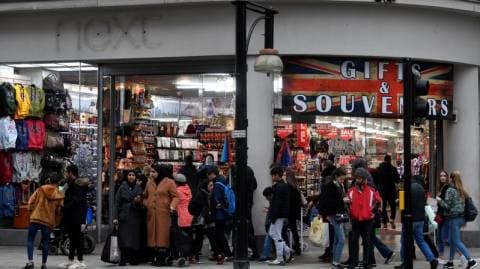
By David Milliken and Andy Bruce
LONDON (Reuters) - British shoppers started spending again early this year after a sluggish end to 2019, another sign that improved sentiment since December's election is translating into stronger economic activity.
Retail sales volumes rose by a greater-than-expected 0.9% on the month in January after a 0.5% fall in December, Britain's Office for National Statistics said on Thursday.
The recovery was even more marked if fuel sales are excluded: sales up 1.6% on the month, the biggest increase since May 2018 and above all forecasts in the Reuters poll.
Sales at petrol stations fell by 5.7% in January, the most since April 2012, which the ONS linked to higher fuel prices. Clothing sales grew by the most since May 2018 after several months of weakness.
Consumer demand faltered in the latter part of 2019 amid a political deadlock in parliament over Brexit. Combined with weak business investment, that kept Britain's economy from growing at all in the last quarter of 2019.
Following a snap election in December, Prime Minister Boris Johnson returned to office with a comfortable majority. Business and consumer sentiment has improved since then, as Britain left the European Union on Jan. 31 with an 11-month transition deal.
The data supports the Bank of England's decision to leave interest rates unchanged last month, on expectations the economy will recover early this year. Sterling erased some earlier losses after the figures came out.
"The British consumer is a hardy beast and having weathered the pre-election uncertainty, we have charged back into the shops," Jeremy Thomson-Cook, chief economist at payments company Equals Group, said.
However, he added, the rebound might not last.
Separate data earlier on Thursday showed employers had made the weakest annual pay offers in more than a year to staff during the three months to the end of January, and many economists predict Brexit uncertainties will re-emerge soon.
Annual sales growth remained lacklustre in January, up just 0.8% on the year after 0.9% annual growth in December, broadly in line with economists' forecasts.
Looking at the three months to January as a whole, annual sales growth was the weakest since May 2013. Excluding fuel, sales did not grow at all between August and December, the weakest such run since comparable records began in 1996.
Earlier in 2019, consumer demand had helped support growth, while businesses had put investment on hold until the course of Brexit became clearer.
Britain has now left the EU, and after the 11-month transition expires at the end of the year, customs checks and new tariffs on trade with the EU are likely.
British retailers had mostly reported subdued results for the Christmas period.
Asda, the British supermarket arm of the world's biggest retailer, Walmart
(Editing by Larry King)